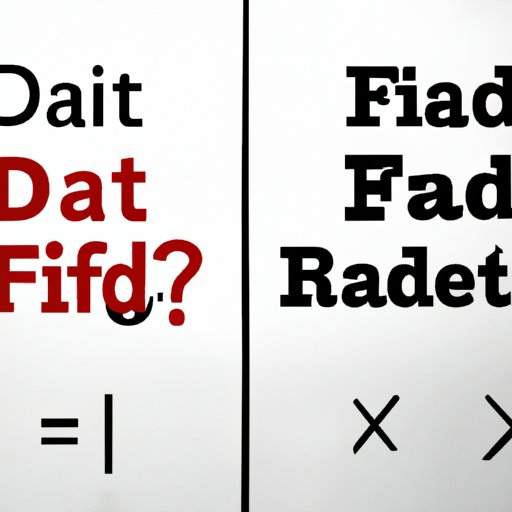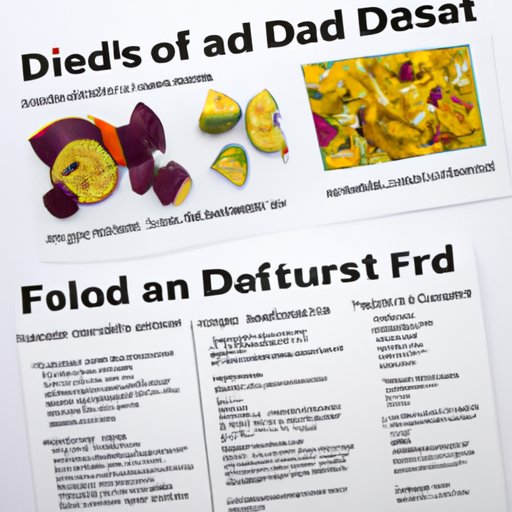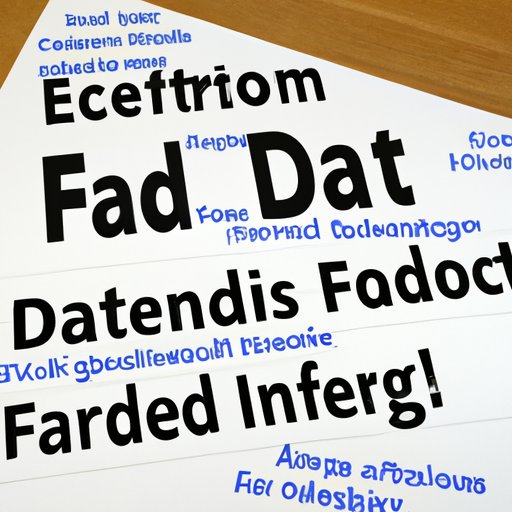Introduction
Fad diets are short-term dietary plans that are often used to achieve rapid weight loss. They have become increasingly popular over the years due to their perceived effectiveness and easy accessibility. While some people may find success with fad diets, it is important to understand the potential risks and benefits associated with them before making any drastic changes to your diet.
A Comprehensive Guide to Popular Fad Diets
There are many different types of fad diets, each with its own unique set of rules and restrictions. Some of the most popular include:
Low-Carb Diets
Low-carb diets limit the intake of carbohydrates, such as breads, pastas, and sweets. These diets are designed to reduce the body’s reliance on glucose for energy, forcing it to use stored fat instead. This can result in rapid weight loss, but also carries the risk of nutrient deficiencies.
Low-Fat Diets
Low-fat diets restrict the amount of fat consumed, usually focusing on monounsaturated and polyunsaturated fats. These diets are often used to lower cholesterol and reduce the risk of heart disease. However, they can also lead to deficiencies in essential fatty acids and other nutrients.
Juice Cleanses
Juice cleanses involve consuming only raw fruit and vegetable juices for several days or weeks. Proponents of this type of diet claim that it helps to detoxify the body and promote weight loss. However, there is no scientific evidence to support these claims, and juice cleanses can cause nutrient deficiencies and dehydration.
Gluten-Free Diets
Gluten-free diets eliminate all foods containing gluten, a protein found in wheat, barley, and rye. This type of diet is beneficial for those with celiac disease or gluten intolerance, but can be difficult to follow and lead to deficiencies in certain vitamins and minerals.
Intermittent Fasting
Intermittent fasting involves alternating periods of eating and fasting. This type of diet is believed to help with weight loss and improve metabolic health. However, it can also lead to fatigue, hunger, and nutrient deficiencies.
Paleo Diet
The Paleo diet is based on the idea that humans should eat the same foods that were eaten by our prehistoric ancestors. This type of diet eliminates grains, legumes, dairy, processed foods, and refined sugars. While some people report positive health benefits from following this diet, it can be difficult to adhere to and may cause nutrient deficiencies.
Ketogenic Diet
The ketogenic diet is a high-fat, low-carbohydrate diet that forces the body to enter a state of ketosis. In this state, the body burns fat for energy, rather than carbohydrates. This type of diet has been shown to be effective for weight loss, but it can be difficult to maintain and carries the risk of side effects, such as nausea, headaches, and fatigue.

Exploring the Pros and Cons of Fad Diets
Fad diets can be effective for weight loss, but there are both pros and cons to consider before starting one. Here is an overview of the potential benefits and drawbacks of following a fad diet.
Pros
1. Weight loss: Fad diets can be effective for losing weight quickly. Many of these diets focus on reducing caloric intake, which can lead to rapid weight loss.
2. Increased energy: Some fad diets, such as the ketogenic diet, can provide a boost of energy due to the increased fat intake. This can be helpful for those who are trying to increase their physical activity.
3. Improved digestion: Many fad diets focus on eliminating certain food groups, such as processed foods, which can lead to improved digestion and reduced bloating.
4. Reduced cravings: Eliminating certain food groups, such as sugar and processed foods, can help to reduce cravings for unhealthy foods.
Cons
1. Nutrient deficiencies: Fad diets often eliminate entire food groups, which can lead to deficiencies in essential vitamins and minerals. This can be especially problematic for those who are pregnant or nursing.
2. Loss of muscle mass: Rapid weight loss can lead to the loss of muscle mass, which can make it more difficult to maintain a healthy weight in the long-term.
3. Unsustainable eating patterns: Fad diets are often difficult to maintain over a long period of time. This can lead to yo-yo dieting, which can be detrimental to overall health.
4. Risk of side effects: Following a strict diet can lead to unpleasant side effects, such as fatigue, nausea, and headaches. It is important to consult a doctor before beginning any type of diet.
An Overview of Fad Diets: What are they and do they Work?
Fad diets have become increasingly popular in recent years as an easy way to lose weight quickly. But do they actually work? Here is an overview of how fad diets work, the different types available, and common misconceptions about them.
How Do Fad Diets Work?
Most fad diets work by drastically reducing calorie intake and/or limiting certain food groups. This can lead to rapid weight loss, but it is important to understand that these results are usually not sustainable in the long-term. Additionally, many fad diets are deficient in essential vitamins and minerals, which can be detrimental to overall health.
Types of Fad Diets
There are many different types of fad diets, ranging from low-carb and low-fat diets to juice cleanses and gluten-free diets. Each type of diet has its own unique set of rules and restrictions, and it is important to understand the potential risks and benefits before making any drastic changes to your diet.
Common Misconceptions About Fad Diets
Many people believe that fad diets are the best way to lose weight quickly, but this is not necessarily true. Fad diets can be effective for short-term weight loss, but they are not a long-term solution. Additionally, many of these diets are deficient in essential vitamins and minerals, which can lead to serious health problems.

Case Studies on the Effects of Fad Diets
To better understand the potential risks and benefits of fad diets, it is helpful to look at case studies of those who have tried them. Here are some success stories and potential health risks associated with following a fad diet.
Success Stories
Some people have reported successful weight loss after following a fad diet. These diets can be effective for those who have the discipline and motivation to stick with them. Additionally, some people have reported increased energy levels and improved digestion after following these diets.
Potential Health Risks
It is important to note that there are potential health risks associated with fad diets. These diets can be deficient in essential vitamins and minerals, which can lead to nutrient deficiencies. Additionally, these diets can be difficult to maintain in the long-term, and can lead to yo-yo dieting.

Evaluating the Risks and Benefits of Fad Diets
Fad diets can be effective for short-term weight loss, but it is important to understand the potential risks and benefits before starting one. Here is an overview of what to consider when deciding if a fad diet is right for you.
Is a Fad Diet Right for You?
Fad diets can be effective for some people, but they are not right for everyone. It is important to understand the potential risks and benefits before starting a fad diet. Additionally, it is important to consult a doctor or nutritionist to ensure that the diet is safe and appropriate for your individual needs.
Considerations Before Starting a Fad Diet
Before starting a fad diet, it is important to consider the following:
- Your current health status
- Your goals and expectations
- Your ability to stick with the diet
- The potential risks and benefits
An In-Depth Look at the Most Popular Fad Diets
Here is an in-depth look at the most popular fad diets and their potential risks and benefits.
Low-Carb Diets
Low-carb diets are designed to reduce the body’s reliance on glucose for energy, forcing it to use stored fat instead. This can result in rapid weight loss, but also carries the risk of nutrient deficiencies. Additionally, these diets can be difficult to maintain in the long-term.
Low-Fat Diets
Low-fat diets are often used to lower cholesterol and reduce the risk of heart disease. However, they can also lead to deficiencies in essential fatty acids and other nutrients. Additionally, these diets can be difficult to adhere to in the long-term.
Juice Cleanses
Juice cleanses involve consuming only raw fruit and vegetable juices for several days or weeks. While some people report positive health benefits from following this diet, it can be difficult to adhere to and may cause nutrient deficiencies and dehydration.
Gluten-Free Diets
Gluten-free diets eliminate all foods containing gluten, a protein found in wheat, barley, and rye. This type of diet is beneficial for those with celiac disease or gluten intolerance, but can be difficult to follow and lead to deficiencies in certain vitamins and minerals.
Intermittent Fasting
Intermittent fasting involves alternating periods of eating and fasting. This type of diet is believed to help with weight loss and improve metabolic health. However, it can also lead to fatigue, hunger, and nutrient deficiencies.
Paleo Diet
The Paleo diet is based on the idea that humans should eat the same foods that were eaten by our prehistoric ancestors. This type of diet eliminates grains, legumes, dairy, processed foods, and refined sugars. While some people report positive health benefits from following this diet, it can be difficult to adhere to and may cause nutrient deficiencies.
Ketogenic Diet
The ketogenic diet is a high-fat, low-carbohydrate diet that forces the body to enter a state of ketosis. In this state, the body burns fat for energy, rather than carbohydrates. This type of diet has been shown to be effective for weight loss, but it can be difficult to maintain and carries the risk of side effects, such as nausea, headaches, and fatigue.
Conclusion
Fad diets can be effective for short-term weight loss, but it is important to understand the potential risks and benefits before starting one. It is also important to consult a doctor or nutritionist to ensure that the diet is safe and appropriate for your individual needs. By understanding the potential risks and benefits of fad diets, you can make an informed decision about whether or not they are right for you.
(Note: Is this article not meeting your expectations? Do you have knowledge or insights to share? Unlock new opportunities and expand your reach by joining our authors team. Click Registration to join us and share your expertise with our readers.)
